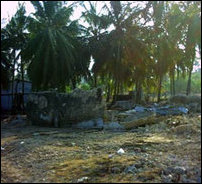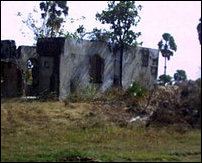Know the Etymology: 372
Place Name of the Day: Monday, 20 October 2014
Kiddangkik-ku'lam, Aanaik-kidangku
கிட்டங்கிக்குளம், ஆனைக்கிடங்கு
Kiṭṭaṅkik-kuḷam, Āṉaik-kiṭaṅkuKiddangki+ku'lam
Aanai+kidangku
The pond in the locality of the warehouse
The elephant pit (the pit to catch elephants)
| Kiddangki |
storehouse (Tamil, DED 1525); Kitangngu: prison, storehouse (Malayalam, DED 1525); Giddangi: storeroom (Kannada, Telugu, DED 1525; Kidangku: prison, storehouse (Tamil, DED 1525); Arisik-kidangku: rice storing place (Tamil, Akaraathi Nika'ndu); Kidangku/ Kiddangki probably related to the root Kida: to lie down (Tamil, DED 1524); Kidappu: resting, anything placed to remain without action (Tamil); or probably related to Kidangku: pit (Tamil, DED 1526); Gadong: store-room (Malay); Godown: storehouse (English, Anglo-Indian, Hobson Jobson traces the origin of Gadong and Godown to Kiddangki in Tamil)
|
| Kidangku |
pit, ditch, trench, moat, pond, tank (Tamil, DED 1526); related to the root Keezh: place or space below, underneath, bottom (Tamil, DED 1619)
|
| Aanai |
also Yaanai: elephant (DED 5161); Aana: elephant (Malayalam, DED 5161); Aane, Yaane: elephant (Kannada, DED 5161); Aane: elephant (Tulu, DED 5161); An: elephant (Kota, Toda, DED 5161); Eanuka, Eanika: elephant (Telugu, DED 5161); Ean, Eani, Aini, Yeanee: elephant (Gondi, DED 5161); cognates in Kolami, Naikri, Parji and Konda too.
|
Kiddangki, meaning a storehouse or warehouse in Tamil and having cognates in Malayalam, Kannada and Telugu, is listed as a word of Dravidian etymology (DED 1525).
A related word Kidangku in Tamil also, in one of its shades of meaning, stands for a storehouse (DED 1525, Akaraathi Nika'ndu).
The etymology may be either related to the verb root Kida in Tamil meaning to lie down (DED 1524) or to the noun Kidangku (DED 1526), from the root Keezh (DED 1629), meaning a pit.
The Anglo-Indian glossary, Hobson Jobson, traces the origin of Gadong in Malay and Godown in English to Kiddangki/ Kidangku.
* * *The Tamil/ Dravidian word, Kidangku (DED 1526), in the context of place names such as Aanaik-kidangku (Aanai: elephant), Kat-kidangku (Kal: rock, stone) etc., mean a trench, pit or ditch.
Digging a trench and covering it with a thatch of green leaves etc., was one of the techniques of catching elephants in the past.
In meaning a pit, ditch etc., the etymology of Kidangku is probably related to the verb root Keezh, meaning a space below, underneath or bottom (DED 1619).
See earlier columns for discussions on Aanai meaning an elephant and Ku'lam meaning a pond, reservoir or lake.
* * *
Ruins of Ollaanthar Kiddangki at Viyaapaari-moolai in Point Pedro [Image courtesy: P. Pushparatnam, University of Jaffna, 2005]

Ruins of Koava'lam Kiddangki at Kat-koava'lam in Point Pedro [Image courtesy: P. Pushparatnam, University of Jaffna, 2005]
is a place in Musali division of Mannaar district.
Aanaik-kidangku is in Puthukkudiyiruppu division of Mullaiththeevu district.
* * *Some related place names:Kiddangki: Kiddangki-veethi: The warehouse road; Kalmunai division, Ampaa'rai district
Ollaanthar Kiddangki: The Dutch warehouse; Viyaapaari Moolai, Point Pedro, Jaffna district
Koava'lam- kiddangki: The warehouse at Koava'lam (curving coastal land); Katkoava'lam, Point Pedro, Jaffna district
Kidangku:Kat-kidangku: The stone pit or rocky ditch; Karipaddamu'rippu, Oddusuddaan division, Mullaiththeevu district; Maangku'lam, Oddusuddaan division, Mullaiththeevu district
First published: Monday, 20 October 2014, 23:48
Previous columns:








